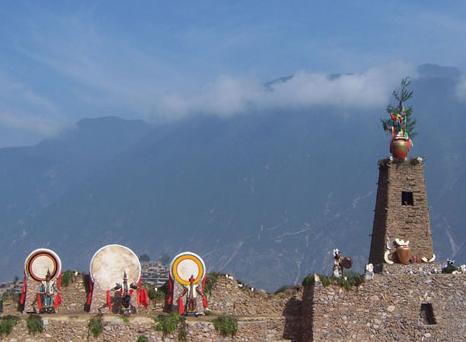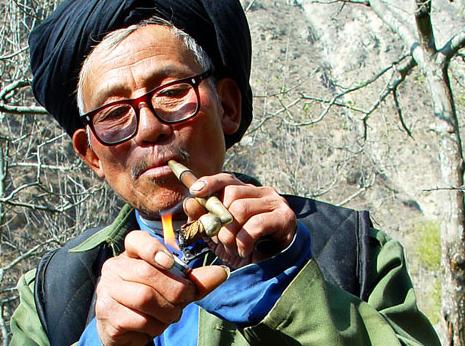
Within the settlement of Qiang Ethnic Group in the upper reaches of Min River of Sichuan Province,sorcerers are called Shibi in the southern dialect.However,given numerous branches of Qiang Ethnic Group,sorcerers are called differently in different dialects and subdialects.For instance,in the northern dialects,they are called Huolu and Huojue.In the subdialect of Yadushi of Maoxian County,they are called Xu.All these are respectful forms of addressing them,for they are not professional clergies,but ordinary laborers.In the primitive society,like other ancient ethnic groups with a long history,Qiang Ethnic Group could not understand many natural phenomena.They vaguely felt that there seemed to be supernatural force underlying happiness,affliction,success and failure.They looked forward to times of good harvests,prosperity and peace,thus giving birth to Shibi.As the messenger of divinities,Shibi is a key figure who holds varied conventional activities like sacrificial ceremonies and who spreads culture of Qiang Ethnicity.Dancing runs through all sacrifices and other conventional activities which are held in Qiang settlement.Shibi presides at all these activities,so he is the indispensable protagonist.Therefore,not only is Shibi an important figure presiding at various activities,but he is also an art teacher good at singing and dancing,as well as a proactive creator of folk dances of Qiang Ethnic Group.By fulfilling his sacred obligations,Shibi plays a decisive role in the content and form of Qiang dances.
Qiang Ethnic Group will carry out activities of offering sacrifices,under such circumstances as worshipping divinities,praying for divine blessing,holding funerals,exorcizing diseases and demons,and also praying for rain when in drought.During these activities,there will be a traditional folk ceremony called Buzila,namely sheepskin-drum dance.Dancing while beating a drum,Shibi will carry a sacred stick on his shoulder,and hold in his hand a dish-like bell made of copper.Besides,when there is a battle,hunting or memorial ceremony for national heroes,Shibi will run around outside the altar,holding a torch and wearing cowhide loricae.He will stoutly lead people in the"loricae dance".Moreover,at wedding ceremonies,Shibi is characterized by easy and slow motions,gentle behavior,and melodious incantations which seem to pray that the newly-wed will always enjoy happiness,prosperity and good luck.Everything done by Shibi seems to be making arrangement for life.Consequently,he is the most authoritative in the conventions and life of the entire Qiang Ethnic Group.The deity genealogy of an ethnic group is a complicated system of cultural symbols,by means of which the group understands,reflects,interprets and controls its society.Shibi is recognized as the critical link of this system.Accordingly,Shibi occupies an eminent position and plays an essential role in dances of Qiang Ethnic Group."Dancing is very solemn and grand for them.It is more a religious ritual and special incantation than entertainment."

Buzila(sheepskin-drum dance)is popular in places like Wenchuan and Lixian Counties.No matter whether the dance is to exert mysterious magic influence on divinities or to entertain them,its ultimate purpose is to pursue prosperity by asking divinities for protection.Usually the dance appears to worship nature or recapture daily work and life.In addition,Shibi will teach history and culture of the ethnic group throughout the dance.As a result,dancers will unconsciously learn the history and culture through pious conventional activities.This not only practices skills for life and labor,improves physical health,but also,in terms of life and culture,enlightens minors who don't work or understand the history and culture of his own nation.All these are closely related to the positive role Shibi plays in Qiang dances.As a result,not only does Shibi inherit and impart the culture of Qiang Ethnic Group,but he is also a singer and dancer of traditional folk art of Qinag Ethnic Group.Shibi plays a significant role in passing down the entire Qiang culture.




